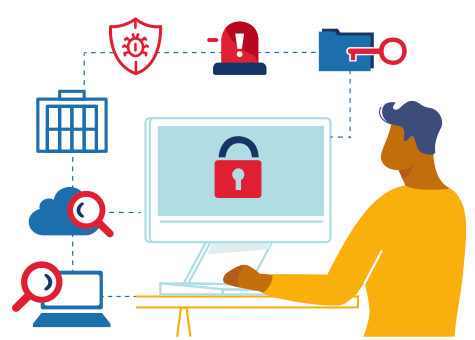As technology continues to advance, the threat of cyber attacks becomes more prevalent than ever. The financial industry is especially vulnerable, as it holds an enormous amount of valuable data and assets. Cybercriminals are constantly seeking ways to exploit weaknesses in cybersecurity defenses to gain access to sensitive information and financial resources. As a result, it's crucial for financial companies to prioritize cybersecurity and take proactive measures to protect themselves from these threats.
In this blog post, we'll explore the importance of cybersecurity in the financial industry and why it's essential for all companies to train their employees and keep their cyber security teams up-to-date. If you're a cyber security professional looking to improve your team's skills and knowledge, this post is for you.
Prevalence of cyber attacks in the financial industry and the importance of prioritizing cybersecurity
The financial industry is a prime target for cybercriminals due to the large amount of valuable data and assets it holds. Cyber attacks on financial institutions have been increasing in frequency and sophistication over the years, making it clear that cybersecurity is no longer a luxury but a necessity for companies in this industry.
According to a report by the Identity Theft Resource Center, the financial services was among most breached sectors in 2022. (You can download the full report here.) These breaches exposed millions of sensitive financial data, such as credit card numbers, bank account information, and social security numbers, to cybercriminals. The consequences of a successful cyber attack can be severe for financial institutions, including financial losses, legal penalties, and reputational damage that can take years to repair.
Moreover, the financial industry faces a constantly evolving threat landscape. Hackers are constantly developing new techniques and strategies to exploit vulnerabilities in financial systems, and the impact of cyber attacks is becoming more severe. A single attack can not only cause immediate financial losses but can also have long-term consequences, such as loss of customer trust and confidence.

Given these risks, it's clear that cybersecurity must be a top priority for financial institutions. By implementing strong cybersecurity measures, companies can better protect their data and assets from cyber attacks, reduce the risk of financial loss, and maintain the trust and confidence of their customers. In the next sections, we'll explore how companies can train their employees and keep their cybersecurity teams up-to-date to stay protected against these evolving cyber threats.
Why cybersecurity is crucial in the financial industry?
When a financial company falls victim to a cyber attack, the consequences can be quite serious. First and foremost, there's the risk of financial losses. Cybercriminals can gain unauthorized access to sensitive financial data, such as credit card information, bank account details, or investment portfolios. With this information, they can carry out fraudulent transactions, drain funds, or even sell the data on the dark web. These financial losses can be substantial, leading to immediate financial harm for the company and its customers.
But it doesn't stop there. A cyber attack on a financial company can also have long-lasting effects on its reputation. Customers trust financial institutions to keep their money and personal information secure. When a breach occurs, it shakes that trust to its core. News of the attack spreads quickly, and customers may question the company's ability to safeguard their data. This can lead to a loss of customers who decide to take their business elsewhere, tarnishing the company's reputation and potentially impacting its bottom line.
The fallout from a cyber attack can extend beyond financial losses and reputation damage. Regulatory bodies and legal authorities may step in, imposing hefty fines and penalties on the company for failing to adequately protect customer data. This can further strain the financial resources of the company and even result in legal battles that could take years to resolve.

In addition, recovering from a cyber attack can be difficult, expensive, and time-consuming. Companies may need to spend money on forensic investigations to ascertain the extent of the breach, put in place more robust security measures to thwart future attacks, and offer affected clients identity theft protection services. These initiatives call for substantial financial resources and may take time and money away from fundamental corporate activities.
In conclusion, a cyber attack on a financial company might have repercussions beyond just short-term financial losses. They may also consist of long-term harm to the business's reputation, loss of client confidence, negative legal outcomes, and recovery-related expenses. That's why it's absolutely crucial for financial companies to prioritize cybersecurity and take proactive measures to protect themselves and their customers from these potential consequences.
The importance of training employees to recognize and respond to cyber threats
One of the most critical aspects of cybersecurity in the financial industry is training employees to recognize and respond to cyber threats. Employees are often the first line of defense against cyber attacks, and their level of awareness and preparedness can significantly impact the overall security posture of a financial company.
Cybercriminals are becoming increasingly sophisticated in their methods, employing various techniques such as phishing emails, social engineering, and malware to gain unauthorized access to systems or trick employees into revealing sensitive information. Without proper training, employees may unknowingly click on malicious links, open infected attachments, or fall victim to deceptive tactics, providing an entry point for cybercriminals.
Financial institutions can empower their workers to become cybersecurity assets rather than vulnerabilities by investing in thorough cybersecurity training programs. Employees who have received training are more prepared to identify and counteract cyberthreats. They gain knowledge of basic social engineering techniques, how to spot strange communications, and how to practice good security hygiene including using strong passwords and keeping software up to date.
Training also plays a crucial role in educating employees about the consequences of a cyber attack and the importance of protecting sensitive data. When employees understand the potential financial losses, reputational damage, and legal implications associated with cyber attacks, they are more likely to take cybersecurity seriously and adhere to best practices.

A skilled staff can also actively participate in incident response initiatives. Employees who have received training are better prepared to report suspicious activity right away, adhere to established standards, and work efficiently with the cybersecurity team in the case of a cyber attack. Their knowledge and prompt responses can greatly reduce the effects of an attack and aid in halting its future propagation or data compromise.
It's crucial to remember that cybersecurity training shouldn't be a one-time thing, but rather an ongoing practice. The threat environment is always changing, and new attack methods and strategies are continually being developed. To ensure that employees are up to date on the most recent risks and protective measures, businesses should offer frequent updates and refreshers.
In conclusion, training employees to recognize and respond to cyber threats is of utmost importance in the financial industry. By raising awareness, providing knowledge, and fostering a culture of vigilance, financial companies can create a stronger human firewall against cyber attacks. The investment in employee training not only enhances the overall security posture but also demonstrates a commitment to protecting customer data and maintaining the trust and confidence of stakeholders.
Top 10 Cybersecurity Courses for 2023
We specialize in delivering top-notch training programs to leading banks and financial companies. As we reflect on the year, we are thrilled to share the most popular courses that our esteemed clients have invested in. Here is a curated list of the courses that garnered significant interest and adoption within the industry this year:
Certified Ethical Hacker CEH v10 Masterclass Training
Secure Coding For Banking and Finance Training
Certified Information Systems Security Professional (CISSP) Training
Certified Information Systems Auditor (CISA) Training
Certified Information Security Manager (CISM) Training
Foundation Certificate in Cyber Security Training
Secure Coding Master Course For Banking and Finance Training
OWASP Top 10, C# Secure Coding Fundamentals Training
4 tips for creating a culture of continuous learning within the cyber security team
You can encourage a culture of ongoing learning and development within your cybersecurity team by putting these suggestions into practice. Their individual skills will be improved, and your organization's cybersecurity program will become stronger and more robust as a result.
- Foster a Learning Environment: Encourage an environment where learning is valued and supported. Provide resources such as books, online courses, and training materials to help team members expand their knowledge and skills. Promote open communication and collaboration, where team members can freely share insights, discuss emerging threats, and learn from each other's experiences.
- Establish Professional Development Plans: Work with each team member to create personalized professional development plans. These plans should outline specific goals and objectives for skill development and advancement. Review and update these plans frequently to make sure they stay current with the changing requirements of the cybersecurity world. Encourage team members to attend industry conferences, acquire appropriate qualifications, and take part in webinars or workshops.
- Encourage Knowledge Sharing: Encourage team members to share their expertise and knowledge with others. Implement knowledge-sharing platforms or internal communities where team members can contribute articles, best practices, case studies, or technical insights. Consider organizing regular brown bag sessions, lunch-and-learns, or workshops where team members can present and discuss cybersecurity topics of interest.
- Embrace Continuous Training and Skill Upgrading: Since the field of cybersecurity is rapidly growing, it is crucial to give it top priority. Give team members the chance to participate in specialized training courses, seminars, or workshops that cover the most recent business trends, potential dangers, and cutting-edge methods. Encourage team members to follow cybersecurity news, publications, and research. To improve particular skill sets, think about collaborating with outside training providers or holding internal training sessions.
Bonus Tip!
Discover a treasure trove of popular cybersecurity e-books on our Online Academy's Free Documents page. Don't miss the opportunity to share this valuable resource with your colleagues, enabling them to access a wealth of top-notch free materials for their own professional growth and development.
For those interested in obtaining a cybersecurity credential as well as businesses looking to educate their staff, Bilginç IT Academy offers a wide range of cybersecurity courses. We take great pride in being the go-to option for many top businesses in the world as a reliable training provider. Our courses are tailored to get you ready for new cyber threats, and our knowledgeable teachers provide you the practical, hands-on training you need to remain on top of potential hazards. Contact us today to enroll in one of our courses and safeguard your digital assets.